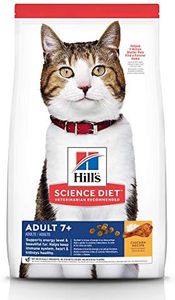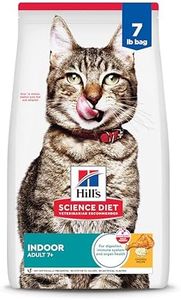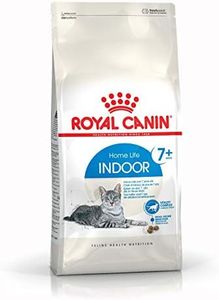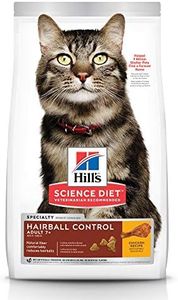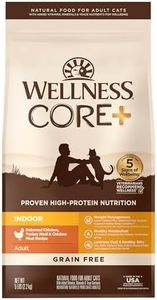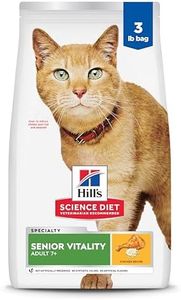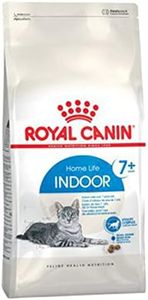We Use CookiesWe use cookies to enhance the security, performance,
functionality and for analytical and promotional activities. By continuing to browse this site you
are agreeing to our privacy policy
10 Best Senior Dry Cat Food
From leading brands and best sellers available on the web.By clicking on a link to a third party's website, log data is shared with that third party.
Buying Guide for the Best Senior Dry Cat Food
Choosing the right senior dry cat food is all about supporting your older cat’s changing needs. As cats age, their metabolism, activity levels, and health conditions can shift, so the food you pick should help maintain their health, energy, and comfort. When shopping, pay attention to the nutritional profile, specific health-supporting ingredients, and the overall ingredient quality to ensure your senior cat thrives.Protein ContentProtein content refers to the amount of protein in the food, usually shown as a percentage. Protein is vital for maintaining your cat’s muscles and overall health, especially as they get older and may naturally lose muscle mass. Senior cats usually benefit from moderate to high protein, but it should come from quality animal sources. For cats with kidney issues, lower protein might be recommended, but most healthy seniors do best with protein levels around 30% or a bit higher on a dry matter basis. You should consider your cat’s health and activity level: active, lean seniors might need more, whereas cats with certain health conditions may require less. Always consult with a vet for specific protein recommendations for your cat.
Fat ContentFat provides energy and supports skin and coat health, but too much can lead to weight gain—a common problem in less active senior cats. Fat content usually falls between 8% and 16% in dry cat foods. For overweight or less active cats, choose a lower fat option. For underweight or very active seniors, a bit more fat could be helpful. Keep an eye on your cat’s weight and adjust accordingly.
Fiber LevelFiber helps with digestion and can prevent common issues like constipation, which some senior cats experience. A typical fiber level ranges from 2% to 5%. Cats prone to hairballs or constipation may benefit from food with a bit higher fiber, while those with loose stools may do better with lower fiber. Observe your cat’s litter box habits to help determine which range is best for them.
Added Joint SupportMany senior cat foods include supplements like glucosamine and chondroitin to help with joint health and mobility. As cats age, arthritis and joint stiffness can develop, so having these ingredients can make a difference. If your senior cat starts to move less easily, look for these kinds of support in the ingredient list. If your cat has no joint issues, it’s not absolutely necessary, but still beneficial as a preventative step.
Calorie DensityCalorie density means how many calories are in each cup or serving of the food. Senior cats may have decreased activity levels, so foods with lower calorie density can help prevent unwanted weight gain. If your cat is still active and lean, you might want something with a bit more calories. Always check the feeding recommendations and adjust based on your cat’s condition.
Kibble Size and TextureOlder cats can have dental issues, like missing teeth or gum sensitivity, making it harder to chew large or very hard kibble. Some senior foods have smaller, softer pieces to make eating easier and more comfortable. Watch how your cat eats their food—if they drop food or seem hesitant, a softer or smaller kibble may be better.
Ingredient QualityLook closely at the ingredient list for real meat, whole grains, or quality vegetable sources, and avoid foods heavy in fillers or artificial additives. Higher-quality ingredients support better digestion and overall wellbeing, which becomes even more important as cats age and may have more sensitive stomachs. Choose foods with clear, recognizable ingredients for the healthiest option.
Special Needs or Added SupplementsSome senior cats have specific health needs, such as sensitive stomachs, urinary health concerns, or the need for additional vitamins and antioxidants. Certain senior foods include extra supplements or are formulated for issues like kidney or thyroid support. If your cat has been diagnosed with any health issue, look for indications on the packaging or ingredient list that the food addresses these needs.
